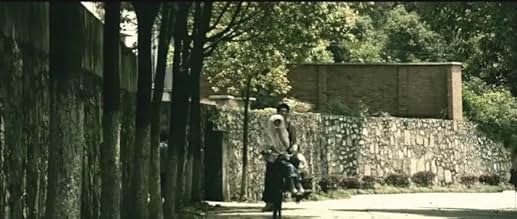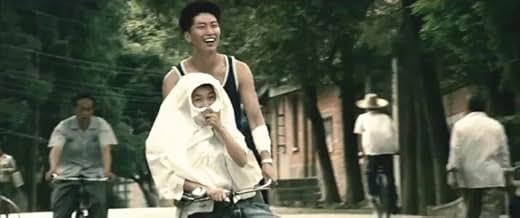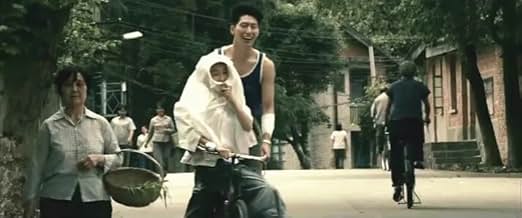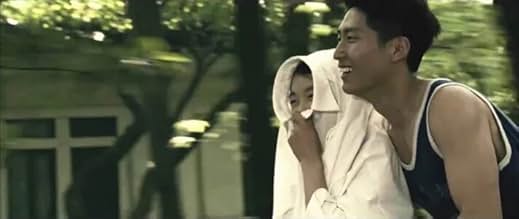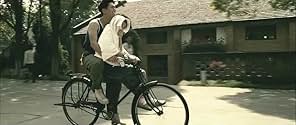Ajouter une intrigue dans votre langueRomance sparks between a young woman and a young man from different economic backgrounds during China's Cultural Revolution of the 1960s and '70s.Romance sparks between a young woman and a young man from different economic backgrounds during China's Cultural Revolution of the 1960s and '70s.Romance sparks between a young woman and a young man from different economic backgrounds during China's Cultural Revolution of the 1960s and '70s.
- Réalisation
- Scénario
- Casting principal
- Récompenses
- 10 victoires et 12 nominations au total
Jinsong Wang
- Director Li (Li Zhuren)
- (as Qi Ke)
Liping Lü
- Wei's Mother (Weihong Muqin)
- (as Liping Lv)
Avis à la une
This movie made me cry so hard. I never believed true and pure love existed until I saw this movie. As everyone says, Movies don't show reality but movies are inspired from and by reality. I hope this type of love still exists in 2024. I hope I find one. But not with this sad ending.
The actors have done an incredible job like the best of best. They touched my soul and I cannot imagine what she went through. It's truly hard.
And now I know what you do for love. The movie's quotes, scenes, scripts, acting, casting everything was so good. Why didn't I find this earlier? Maybe I wouldn't have understood. But I do now. And I'm happy I did.
The actors have done an incredible job like the best of best. They touched my soul and I cannot imagine what she went through. It's truly hard.
And now I know what you do for love. The movie's quotes, scenes, scripts, acting, casting everything was so good. Why didn't I find this earlier? Maybe I wouldn't have understood. But I do now. And I'm happy I did.
I love Chinese cinema and without doubt this was a finely crafted movie BUT I just didn't find it particuarly engaging. It's a love story and very little else. Some parts made me reflect on Communist China and the difficulty of navigating a relationship under a regime where so much needs to be kept secret, which can interfere with the trust-forming process, but otherwise I couldn't find much else to explore. So if you want to go on the ride with them (which really just consisted of lots and lots and lots of superficially romantic moments) then fine, but I was looking for something more. And to have the utterly heartbreaking end for no apparent reason than to tear our hearts out was too heavy of a punchline for such a light setup.
In some restaurants, the chef goes out of his way to create complex dishes, with intricate combinations of tastes, colours and cooking styles. Others specialize in simple dishes, that stand out because of the quality of the ingredients. A simple pasta pesto can be a treat if it's made with the best olive oil, freshly grated parmesan and homegrown basil.
Under the Hawthorn Tree is like such a simple, but delicious dish. It's a straightforward story of a forbidden love, told in a basic way, without many frills. But Zhang Yimou is such a craftsman, that he doesn't need much to make a great movie.
The story is set during the cultural revolution, a period of ruthless oppression by the communist regime. The young girl Jing is being watched by the authorities because her father was a 'reactionary' and she risks losing her job as a teacher. During a trip to the countryside she falls in love with Sun. Her mother is afraid the affair will harm Jing's future career, and she forbids the two lovers to see each other.
Zhang Yimou tells the story in a simple way, focusing on the two lovers. He uses title cards to make the story go forward, a smart move because it prevents the script from having to explain too much. In this way, Zhang concentrates on the story of Jing and her lover Sun, and nothing else.
China in the seventies was a country where people led simple lives. Zhang emphasizes this by using simple props, like a goldfish key-chain made of yarn and beads, or a metal bowl with a special decoration. The hawthorn tree from the title also has a symbolic meaning, and in the very last image of the movie, when we see the tree blossoming, Zhang has an unexpected surprise that will make you smile.
The acting is wonderful. The two leads tell just as much with their eyes, their laughs and their expressions as with their words. Take for example the scene where Jing gives her goldfish to Sun, and the camera lingers on their faces to show us how they feel. Wonderful film making.
With this film, Zhang Yimou returns to his earlier style of film making, telling stories about the daily life in China. Under the Hawthorn Tree has more in common with his lesser-known films like Not One Less or The Road Home, than with his visually more spectacular films like The House of Flying Daggers, or even Raise The Red Lantern.
Some people may be disappointed by the slow story, in which nothing spectacular happens. But some of history's greatest film classics are slow and subtle. In a way, Under the Hawthorn Tree made me think of David Lean's classic Brief Encounter, another story about a forbidden love, that stands out because of the impeccable directing and acting.
Under the Hawthorn Tree is like such a simple, but delicious dish. It's a straightforward story of a forbidden love, told in a basic way, without many frills. But Zhang Yimou is such a craftsman, that he doesn't need much to make a great movie.
The story is set during the cultural revolution, a period of ruthless oppression by the communist regime. The young girl Jing is being watched by the authorities because her father was a 'reactionary' and she risks losing her job as a teacher. During a trip to the countryside she falls in love with Sun. Her mother is afraid the affair will harm Jing's future career, and she forbids the two lovers to see each other.
Zhang Yimou tells the story in a simple way, focusing on the two lovers. He uses title cards to make the story go forward, a smart move because it prevents the script from having to explain too much. In this way, Zhang concentrates on the story of Jing and her lover Sun, and nothing else.
China in the seventies was a country where people led simple lives. Zhang emphasizes this by using simple props, like a goldfish key-chain made of yarn and beads, or a metal bowl with a special decoration. The hawthorn tree from the title also has a symbolic meaning, and in the very last image of the movie, when we see the tree blossoming, Zhang has an unexpected surprise that will make you smile.
The acting is wonderful. The two leads tell just as much with their eyes, their laughs and their expressions as with their words. Take for example the scene where Jing gives her goldfish to Sun, and the camera lingers on their faces to show us how they feel. Wonderful film making.
With this film, Zhang Yimou returns to his earlier style of film making, telling stories about the daily life in China. Under the Hawthorn Tree has more in common with his lesser-known films like Not One Less or The Road Home, than with his visually more spectacular films like The House of Flying Daggers, or even Raise The Red Lantern.
Some people may be disappointed by the slow story, in which nothing spectacular happens. But some of history's greatest film classics are slow and subtle. In a way, Under the Hawthorn Tree made me think of David Lean's classic Brief Encounter, another story about a forbidden love, that stands out because of the impeccable directing and acting.
There is a scene, about two thirds of the way through, in which an older woman, mother to three children, sits down with her eldest daughter and the boy she has fallen in love with, and for about five minutes, they speak to each other. These are hard times – all three know it. At the beginning of the scene, the mother is sceptical. She treats the two as children, with their heads in the clouds. But the conversation develops, and gradually, we realise a change in the mother. She cannot back down – in practical, surviving terms, she is in the right. But she softens her approach, and by the end, even has a kind of basic respect for the two, behind her frosty exterior. For she has seen the love that these two have for each other, and recognised it. It was then that I knew I was watching a great movie
If 'Lola' was a disappointment in the Asia Triennial Film Festival this year, Zhang Yimou's new film – a love story set during the Chinese Cultural Revolution – makes up for it tenfold. It's not very often I get the opportunity to rave about a film like this, as they are so rarely done well; cynicism, plot complication and saccharine cliché at turns are what often makes a love story such as this horrifically superficial and painful to watch. But Yimou knows what he is doing. Arguably the finest working Chinese director (with the masterpieces 'Raise The Red Lantern', 'Hero' and 'House of Flying Daggers' to his name), he has succeeded here in making a beautiful, heartfelt film, spilling over with the love and care that has gone into its production.
Zhang Jingqiu is a student sent to do research and write a report for her school on a small village in Yichang City. She stays with the head of the village and his family. While there, she meets Sun, a geology student. What follows is inevitable. But how delicately rendered it is: Jing is the most beautiful, innocent young woman Sun has ever seen, and Jing, emotional and vulnerable, is amazed by him. Love at first sight! But this isn't as whimsical as it sounds. Yimou hasn't completely forgotten his political ideals and ability for scathing criticism: with this latest endeavour, he explores just how stifled and suffocating Mao's regime was for everyone under his power, and the emotional deadlock that threaten to destroy his protagonists at every turn. Frolicking, even in the most innocent sense of the work, was risky; Sun and Jing are from different classes, exacerbating the issue. Were they to be found out, her life and ambitions to work as a teacher would be ruined.
I was unsure, during the first half of the film, what to think. Yimou makes some interesting structural choices as regarding his narrative – many of the scenes are divided by inter-titles, telling us of an event we are not allowed to see, and then moving on to its aftermath. Most directors would die before doing this – especially in a film requiring the emotional impact this needs – and, I admit, I doubted its benefits at first. But instead of hindering the drive of the plot, Yimou has used it in such a way – not to cut the film into a digestible running length, but simply to avoid over melodramatics, and focus (almost entirely) on the couple in question. Supplementary information is given to us by other means – the filmed scenes are belong exclusively to Yimou's exploration of our two protagonists' relationship. It works perfectly.
Of course, we all know the rules. Both lovers are alive at the beginning; the same cannot be said after the end credits begin to roll. What makes this movie so wonderful isn't its startling originality; it isn't going to revolutionise cinema as we know it, or spark off long lasting controversy. Rather, what we are offered is a little less prestigious, but by no means less special. What we find is emotional honesty – when we start to cry at the end, we don't feel cheated; instead, we revel in the director's success. More importantly, though, we have felt for his characters, having engaged with them completely, and have a kind of renewed respect for the kind of pure, unconditional love we have been shown. The film is yet another example of Yimou's mastery of the 'anti-melodrama' – much like his early work, this is incredibly restrained, beautifully measured and patiently observed, shot through with a warmth and tender humanity that shouldn't inspire anything but admiration. Cynics – stay away. But for all the romantics out there (of which I, admittedly, am one), I couldn't recommend this more highly. Simply put, it's exquisite.
If 'Lola' was a disappointment in the Asia Triennial Film Festival this year, Zhang Yimou's new film – a love story set during the Chinese Cultural Revolution – makes up for it tenfold. It's not very often I get the opportunity to rave about a film like this, as they are so rarely done well; cynicism, plot complication and saccharine cliché at turns are what often makes a love story such as this horrifically superficial and painful to watch. But Yimou knows what he is doing. Arguably the finest working Chinese director (with the masterpieces 'Raise The Red Lantern', 'Hero' and 'House of Flying Daggers' to his name), he has succeeded here in making a beautiful, heartfelt film, spilling over with the love and care that has gone into its production.
Zhang Jingqiu is a student sent to do research and write a report for her school on a small village in Yichang City. She stays with the head of the village and his family. While there, she meets Sun, a geology student. What follows is inevitable. But how delicately rendered it is: Jing is the most beautiful, innocent young woman Sun has ever seen, and Jing, emotional and vulnerable, is amazed by him. Love at first sight! But this isn't as whimsical as it sounds. Yimou hasn't completely forgotten his political ideals and ability for scathing criticism: with this latest endeavour, he explores just how stifled and suffocating Mao's regime was for everyone under his power, and the emotional deadlock that threaten to destroy his protagonists at every turn. Frolicking, even in the most innocent sense of the work, was risky; Sun and Jing are from different classes, exacerbating the issue. Were they to be found out, her life and ambitions to work as a teacher would be ruined.
I was unsure, during the first half of the film, what to think. Yimou makes some interesting structural choices as regarding his narrative – many of the scenes are divided by inter-titles, telling us of an event we are not allowed to see, and then moving on to its aftermath. Most directors would die before doing this – especially in a film requiring the emotional impact this needs – and, I admit, I doubted its benefits at first. But instead of hindering the drive of the plot, Yimou has used it in such a way – not to cut the film into a digestible running length, but simply to avoid over melodramatics, and focus (almost entirely) on the couple in question. Supplementary information is given to us by other means – the filmed scenes are belong exclusively to Yimou's exploration of our two protagonists' relationship. It works perfectly.
Of course, we all know the rules. Both lovers are alive at the beginning; the same cannot be said after the end credits begin to roll. What makes this movie so wonderful isn't its startling originality; it isn't going to revolutionise cinema as we know it, or spark off long lasting controversy. Rather, what we are offered is a little less prestigious, but by no means less special. What we find is emotional honesty – when we start to cry at the end, we don't feel cheated; instead, we revel in the director's success. More importantly, though, we have felt for his characters, having engaged with them completely, and have a kind of renewed respect for the kind of pure, unconditional love we have been shown. The film is yet another example of Yimou's mastery of the 'anti-melodrama' – much like his early work, this is incredibly restrained, beautifully measured and patiently observed, shot through with a warmth and tender humanity that shouldn't inspire anything but admiration. Cynics – stay away. But for all the romantics out there (of which I, admittedly, am one), I couldn't recommend this more highly. Simply put, it's exquisite.
Zhang Yimou returns to a more basic form of film-making in this touching story of innocent love from China's Cutural Revolution era. Very strong performances add substance to an otherwise simple story of young lovers burdened by societal difficulties in their efforts to be together. Ms. Zhou is very good in her role as a young, innocent woman who meets a special boy, Shawn Dou, amid the turbulence of China's revolutionary years. Both girl and boy are sent to the country-side to labor under Mao's crazed design for social re-ordering. The film does not focus so much on the madness of the times as on the fear of being labeled politically incorrect which, coupled with the socially conservative norms of traditional China, serve to encumber the innocent desire to be together. A slow but nicely filmed story of heartache and heartbreak.
Le saviez-vous
Meilleurs choix
Connectez-vous pour évaluer et suivre la liste de favoris afin de recevoir des recommandations personnalisées
- How long is Under the Hawthorne Tree?Alimenté par Alexa
Détails
- Date de sortie
- Pays d’origine
- Site officiel
- Langue
- Aussi connu sous le nom de
- Under the Hawthorne Tree
- Sociétés de production
- Voir plus de crédits d'entreprise sur IMDbPro
Box-office
- Montant brut mondial
- 23 004 431 $US
- Durée1 heure 54 minutes
- Couleur
- Mixage
- Rapport de forme
- 2.35 : 1
Contribuer à cette page
Suggérer une modification ou ajouter du contenu manquant


